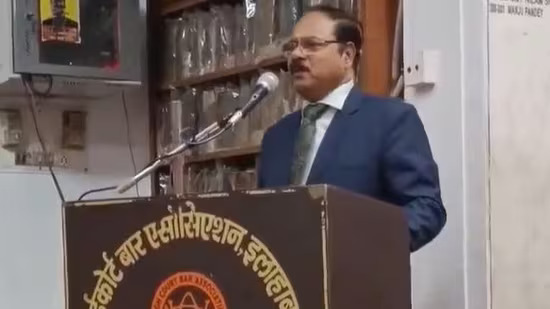Prayagraj (Uttar Pradesh), December 11:
A statement made by Justice Shekhar Kumar Yadav of the Allahabad High Court has stirred a major controversy, leading to demands for his impeachment. The Congress party has initiated a campaign to bring an impeachment motion against the judge, gathering support from several Members of Parliament (MPs).
Congress leaders, including senior MP and lawyer Kapil Sibal, have strongly criticized Yadav’s remarks made at a World Hindu Council (VHP) event, which they say violate the neutrality expected of a judicial figure. Sibal emphasized that the matter is serious enough to warrant an impeachment motion in the ongoing winter session of Parliament. He revealed that over 30 Rajya Sabha MPs have already signed a petition, expressing their support for the motion.
Justice Yadav’s controversial speech, delivered on Sunday, sparked widespread condemnation for his comments, which many perceive as biased and politically charged. The incident has led to a sharp response, with politicians and legal experts calling for immediate action.
Kapil Sibal added that an impeachment notice will soon be presented in Parliament, stressing that if a judge makes such public statements, it could be seen as a violation of their oath of office. The remarks were seen by many as a breach of judicial propriety and independence.
In accordance with India’s Constitution, the impeachment process for a High Court judge is a stringent one. It requires the support of at least 100 MPs in the Lok Sabha and 50 in the Rajya Sabha to initiate the process. The motion is then reviewed by a committee, which includes a Supreme Court judge, a High Court Chief Justice, and a legal expert. If the committee finds merit in the allegations, the motion moves forward, and it requires a two-thirds majority in both Houses of Parliament to be passed. If both Houses approve it, the motion is sent to the President, who, upon approval, can remove the judge from office.
While no High Court judge has ever been removed through impeachment in India, the current situation could be a turning point.
Regarding the conduct of judges, legal experts have pointed out that there is no formal code of conduct for judges. However, judges are expected to maintain self-discipline, especially when making public statements. Retired Justice Shahjeet Yadav of the Allahabad High Court commented that while there is no written code, judges are aware of the importance of maintaining the dignity of their position and understanding when it is appropriate to speak publicly.
The controversy also led the Supreme Court to take notice of the issue. The Court has asked the Allahabad High Court for a detailed report on the matter, with the investigation expected to take its course in the coming weeks.
As the political and legal battle intensifies, the nation will be watching closely to see how this situation unfolds, and whether it leads to any significant changes in how judicial conduct is viewed in India.



